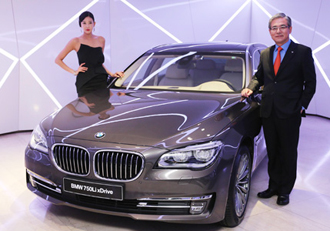In Korea US, Japanese Lag Surging German Import Cars
German Invasion: BMW dominates sales in the world's 5th biggest premium car market.
German imports continued to increase thei dominance of the world’s fifth-largest luxury car market while sales of Japanese and American cars continue to lag badly.
Overall, import cars sales hit 10,576 units in August, a 16% jump over the same month of 2011. Much of that increase is due to the growing popularity of German cars, especially BMW which became S. Korea’s second biggest auto company in revenue terms in the first quarter of the year.
On the other hand, Japanese and American cars continue to lose ground relative to German rivals though they appear to be holding their own compared with domestic Korean brands.
As of August European cars held 77.9% of S. Korea’s import car market, leaving just 15% to Japanese marques and 7.1% to US brands.
But Japanese car sales took a sharp downturn in August. The biggest luxury loser was Lexus which sold just 190 units for the month, a 39.1% drop over last August. Nissan suffered a whopping 70.5% drop while Infiniti saw sales plunge by half. More modest declines were suffered by Toyota, Honda, Subaru and Mitsubishi.
At least some ostensible reasons are apparent for the declines suffered by the Japanese brands. For example, the Lexus drop is attributed to customers waiting for the debut of new-year models in September. Japanese brands in general are thought to be suffering from a nationalistic backlash in the wake of intense drama over the flareup of the Dokdo (Takeshima) islet dispute.
Most observers are baffled at the lack of success of US brands in expanding their share of the Korean import market. In past decades the problem was attributed to styling, quality and fuel-economy issues. But even the current generation of drastically restyled luxury models haven’t been able to match the status image enjoyed by BMW, Mercedes-Benz and Audi. In that respect, S. Korea is little different from other top luxury markets like Japan, China and even US where brands like Cadillac and Lincoln have struggled against the Germans.
Remarkably, BMW — which sells only pricey luxury cars in Korea — became the nation’s number two auto company in revenue terms, passing GM which had held that spot for several years. BMW sold 530.8 billion won ($4.71 billion) worth of cars in Q1 while GM sold 508.1 billion ($4.51 bil.).
In unit terms, however, BMW — including Rolls-Royce and Mini — sold 7,825 in Q1 while GM sold 29,420. GM operates an assembly plant outside of Seoul while BMW has no production facilities in Korea, according to Chosun Ilbo.
In unit terms Hyundai Motors — including its Kia affiliate — sold 218,581 during Q1, putting it in the top spot. Following GM are Renault Samsung and Ssangyong.
In revenues terms, after Hyundai and BMW are the Volkswagen Group with 448.6 billion won ($3.98 bil.), Renault Samsung with 415.4 billion won ($3.69 bil.) and Mercedes Benz with 347.2 billion won ($3.08 bil.).
Even in unit terms luxury imports outsell their domestic Korean counterparts. In 2011 60,000 imports were sold in the premium segment defined as cars costing over 50 million won ($44,400) compared to only 49,000 domestics.
With annual sales of 1.58 million units this year S. Korea is the world’s 12th largest auto market. But it’s the world’s fifth biggest premium car market with annual sales of 120,000 units. In terms of sales of the ultra-premium BMW 7 series Korea is the fourth largest market behind China, the US and Germany, according to BMW Korea.
The nation’s premium import segment continues to surge despite the lingering effects of the global financial crisis. Segment sales surged 20% annually from 29,000 units in 2008 to 60,000 last year.

S. Korea is the world's 4th largest market for the BMW 7 series.

